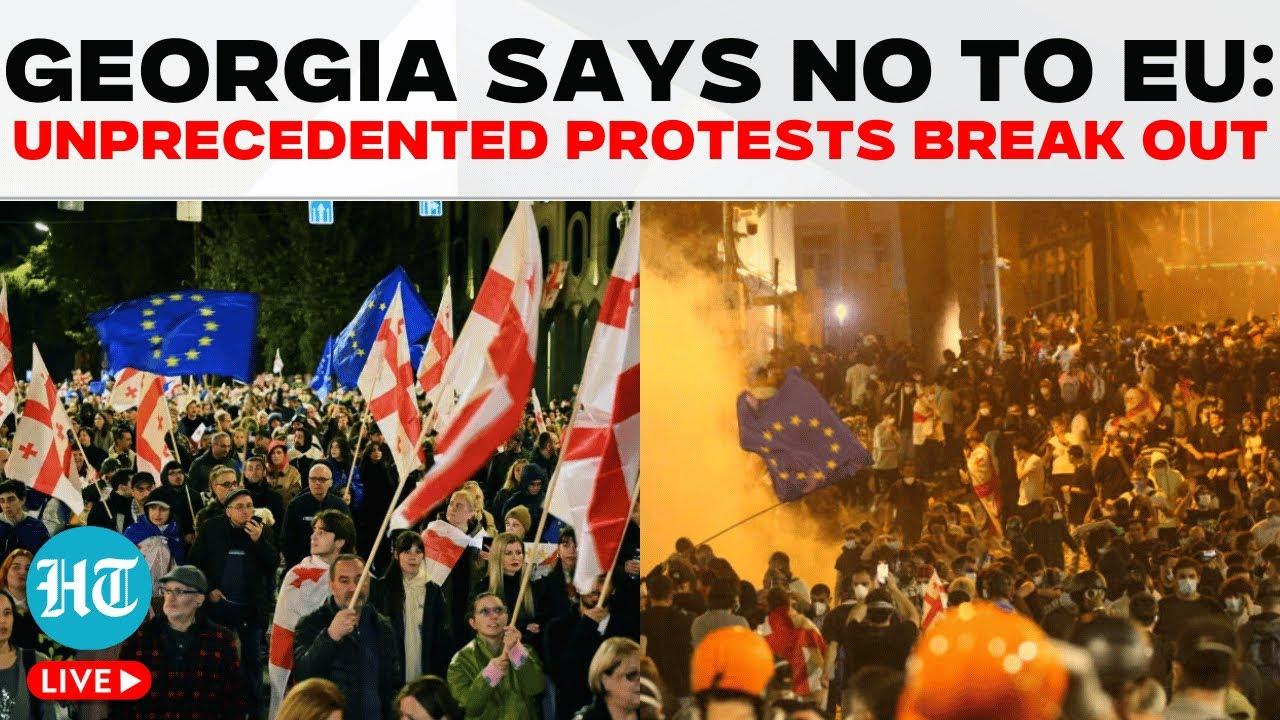Georgia Rocked by Protests as EU Membership Hopes Fade
Tbilisi, Georgia has become a hotbed of unrest as thousands of citizens took to the streets, fiercely protesting their government’s decision to pause talks on joining the European Union. The move, which the Georgian government accuses the EU of forcing through "blackmail," has ignited a firestorm of public disapproval.
The clashes, some fiercely violent, have seen protesters face off against riot police, with images of burning tires and tear gas filling social media feeds.
"We want a European future," declared one protester, encapsulating the sentiment felt by many who see EU membership as synonymous with democratic values and economic opportunity.
The Georgian government, however, insists the decision was necessary, citing what they perceive as unfair demands from the EU. "[quote from Georgian official]," they stated.
This stance has sparked fury among Georgian diplomats, who criticize the decision and express deep concern about its implications. "Georgian diplomats decry halt to EU talks after dozens arrested in pro-EU protests," Reuters reports.
The standoff has attracted international attention, with concerns growing about the potential for further instability in the region. The situation highlights the complex geopolitical landscape in Eastern Europe, where countries like Georgia are caught between influencing forces vying for their allegiance.
For the United States, the unfolding events in Georgia raise questions about Western influence in the region and the effectiveness of promoting democratic values abroad. As tensions escalate, Washington will likely face pressure to tread carefully, weighing its commitment to democratic principles against the delicate balance of power in the region.
The coming days will be critical in determining the course of events in Georgia. Will the protests subside, or will they escalate into a full-blown political crisis? The answer will have significant repercussions for Georgia’s future and for the broader geopolitical landscape.
[Include social media embeds and any relevant multimedia as per the original articles].
## Georgia’s EU Dreams on Hold: Protests Erupt as Hope for Membership Fades
Thousands throng Tulibi’s streets amidst clashes with police after Georgia’s government struggles to secure European Union membership. This move, which the government claims is due to ”blackmail” by the EU, has ignited fury among citizens who view EU membership as a key to democratic advancement and economic prosperity.
This delicate situation demands in-depth analysis. In this exclusive interview, we delve into the crisis with **Dr. Nana Lortkipanidze**, a leading expert on Georgian politics and international relations from Tbilisi State University, and **Mark Jones**, a senior analyst on Eastern European affairs at the Council on Foreign Relations. We’ll explore the multifaceted implications of this standoff for Georgia’s future, for the geopolitical landscape in Eastern Europe, and for Western influence in the region.
### The Trigger: EU Talks Stalled
**Dr. Lortkipanidze**, what are the immediate triggers behind the protests, and what are the key concerns expressed by the Georgian people?
“The frustration is palpable. This perceived roadblock to EU membership is seen as a betrayal by many Georgians who have long dreamt of a European future. The protesters see it as a denial of their aspirations for a democratic, prosperous society, and they’re deeply disappointed by what they perceive as unyielding demands from the EU.”
**Mr. Jones**, amidst the strong reactions from Georgia, what is the EU’s position on the stalled talks?
“The EU’s stance emphasizes the need for concrete reforms in Georgia, particularly regarding rule of law and democratic institutions. They see these reforms as crucial prerequisites for a accomplished EU membership. This is not unusual in accession negotiations; however, the perception in Georgia is that the EU is moving the goalposts.”
### A Nation Divided: Government vs. Citizens
**Dr.Lortkipanidze**, the government has used strong language, accusing the EU of “blackmail.” How does this rhetoric play out on the ground, and does it resonate with the protestors?
“This divisive language is further exacerbating tensions. While the government seeks to frame the situation as an EU pressure tactic, many citizens see it as an attempt to deflect from the government’s own shortcomings in meeting EU standards. This lack of transparency has eroded public trust and fueled the protests.”
**Mr. Jones**,how meaningful is the role of geopolitical tensions between Russia and the West in this situation?
“Georgia’s geostrategic location makes it a focal point in the broader East-West competition. Russia has actively sought to maintain its influence in the region, and its interests often clash with those of the EU and the West. this geopolitical context undeniably influences the situation in Georgia.”
### What Lies Ahead: the Road Forward
**Dr. Lortkipanidze**, what are the potential consequences of this crisis for Georgia’s political future?
“This crisis poses a significant threat to Georgia’s democratic stability. The escalation of violence, the erosion of public trust in the government, and the deepening political polarization paint a worrisome picture. It’s vital that dialogue and compromise prevail to prevent further unrest.”
**Mr. Jones**, what are the broader geopolitical ramifications of this standoff for the EU and for the West’s influence in Eastern Europe?
“This situation highlights the challenges facing the EU’s enlargement policy. It raises questions about the effectiveness of promoting democratic values abroad and the potential for geopolitical competition to undermine these efforts.
The coming weeks and months will be crucial in determining whether Georgia can find a path towards reconciliation and renewed engagement with the EU. Alternatively, this crisis may mark a turning point for georgia, pushing it further into Russia’s sphere of influence.”
This complex situation underscores the importance of continued international attention and engagement with georgia.
**we urge our readers to stay informed and engage in constructive dialogue about the future of Georgia.
For further insight into this evolving crisis, we recommend exploring these related articles:**
* “Georgian Government Faces Backlash Over EU Stance” (Reuters)
* “Russia Reacts to Georgian Protests” (BBC News)


